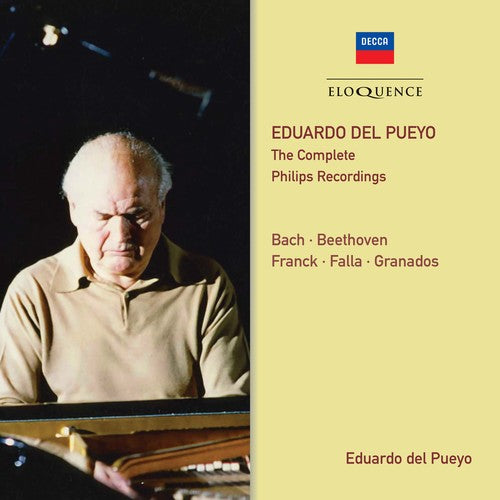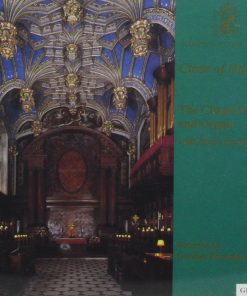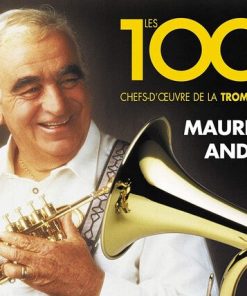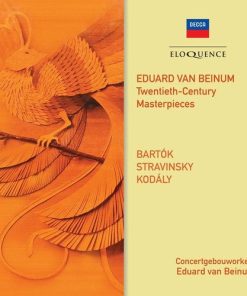EDUARDO DEL PUEYO: COMPLETE PHILIPS RECORDINGS (5 CDS) DECCA
$ 34,99 $ 20,99

A newly remastered, richly documented set celebrating the art of a Spanish Beethoven specialist recorded at the peak of his powers in the late 1950s.
Born in Zaragoza in 1905, Eduardo del Pueyo left Spain in 1920 to enter the Paris Conservatoire but rejected the teaching of Marguerite Long outright. In thrall to Beethoven’s genius in particular, he chose instead to become, as it were, a great-grand pupil of Franz Liszt through the example of Marie Jaëll, as passed down to Jeanne Bosch van’s Gravemoer. In its strength and sense of scale, del Pueyo’s playing as recorded here makes him a worthy inheritor of the Jaëll method. His playing is based on absolute respect for the musical text, shorn of false pathos but all the more sensitively expressive because the expressions flows from a lucid musical line.
Having withdrawn from public performance for a period of reflection and private study, del Pueyo brought freshly reconsidered cycles of the Beethoven sonatas to audiences across Europe in the late 1930s and audiences (especially in Germany) thrilled to a Beethoven for their time, where everything was audible and whose steely rigour set the composer free from sentimentality, much as Erdmann and Schnabel were doing in their own ways.
Del Pueyo recorded a complete Beethoven cycle much later in his career but these Philips recordings of 10 sonatas, newly remastered for CD, date from 1958 when, having settled in Brussels, he followed up naturally idiomatic accounts of de Falla and Granados with an abortive cycle, beginning at the summit with the ‘Hammerklavier’. The urgency with which he launches into the imperious chords at the opening are a good indication of where radical playing immediately places the listener: this is Beethoven playing that really counts for something.
Del Pueyo closed his Philips contract in 1960 with Franck and Bach: a poised, radiant and simple account of the Italian Concerto and a First Partita concluding with a remarkable account of the Gigue where he barely seems to touch the keyboard. It sets the seal on another piano release of exceptional historical significance from Eloquence.

An interpretatively stimulating collection. –GRAMOPHONE (2019 REISSUE)
‘Del Pueyo plays Nights in the Gardens of Spain with exceptional feeling for the style.’ High Fidelity, March 1957
‘[The Danzas espanolas] are played extremely well by del Pueyo, who… appears to be a fine technician and a thoughtful stylist.’
High Fidelity, March 1958
‘I found myself thoroughly interested in his version of the “Hammerklavier” even though I did not always agree with his view of it… he plays the “Les Adieux” Sonata most beautifully.’
Gramophone, November 1959

CD 1
CÉSAR FRANCK
Prélude, Chorale et Fugue
JOHANNES SEBASTIAN BACH
Italian Concerto in F major, BWV 971
Partita No. 1 in B flat major, BWV 825
LUDWIG VAN BEETHOVEN
Piano Sonata No. 21 in C major, Op. 53 ‘Waldstein’
CD 2
LUDWIG VAN BEETHOVEN
Piano Sonata No. 8 in C minor, Op. 13 ‘Pathétique’
Piano Sonata No. 23 in F minor, Op. 57 ‘Appassionata’
Piano Sonata No. 18 in E flat major, Op. 31 No. 3 ‘The Hunt’
CD 3
Piano Sonata No. 14 in C sharp minor, Op. 27 No. 2 ‘Moonlight’
Piano Sonata No. 26 in E flat major, Op. 81° ‘Les adieux’
Piano Sonata No. 29 in B flat major, Op. 106 ‘Hammerklavier’
CD 4
ENRIQUE GRANADOS
Danzas Espańolas, Op. 37
CD 5
Goyescas
MANUEL DE FALLA
Noches en los jardines de Espańa
Orchestre des Concerts Lamoureux
Jean Martinon
Eduardo del Pueyo, piano

Fast Shipping and Professional Packing
Due to our longstanding partnership with UPS FedEx DHL and other leading international carriers, we are able to provide a range of shipping options. Our warehouse staff are highly trained to pack your goods exactly according to the specifications that we supply. Your goods will undergo a thorough examination and will be safely packaged prior to being sent out. Everyday we deliver hundreds of packages to our customers from all over the world. This is an indication of our dedication to being the largest online retailer worldwide. Warehouses and distribution centers can be located in Europe as well as the USA.
Orders with more than 1 item are assigned processing periods for each item.
Before shipment, all ordered products will be thoroughly inspected. Today, most orders will be shipped within 48 hours. The estimated delivery time is between 3-7 days.
Returns
The stock is constantly changing. It's not entirely managed by us since we are involved with multiple parties such as the factory and our storage. The actual stock can fluctuate at any time. Please understand it may happen that your order will be out of stock when the order is placed.
Our policy is valid for 30 days. If you haven't received your product within 30 days, we're not able to issue either a return or exchange.
You are able to return a product if it is unused and in the same condition when you received it. It must also still remain in the original packaging.





















































